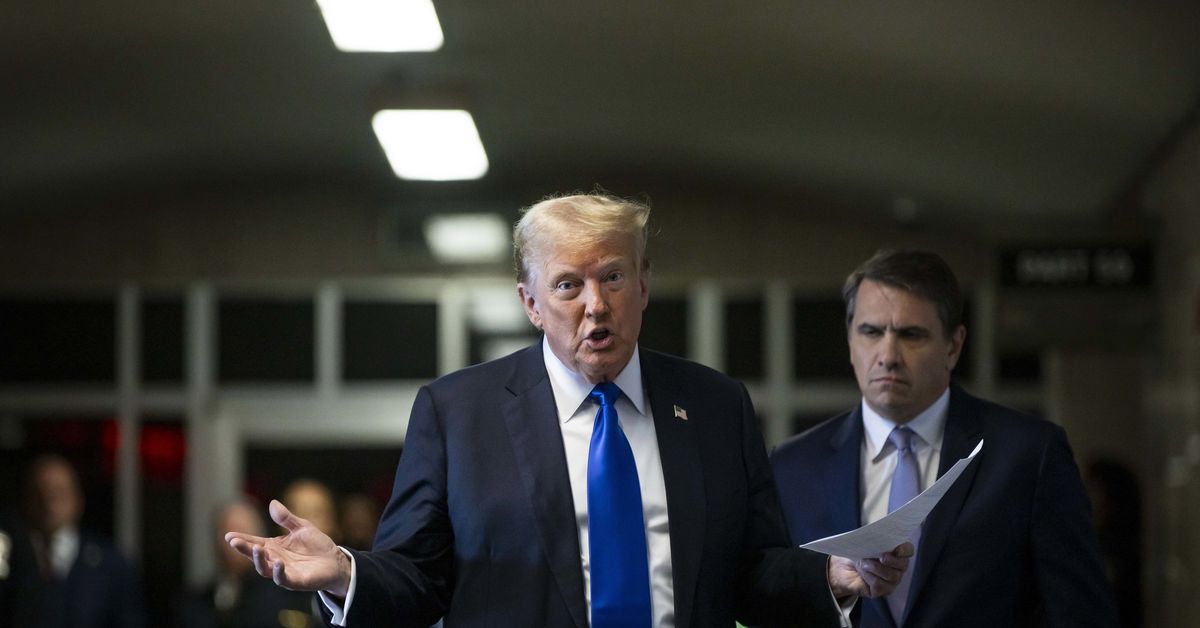The judge responded to a jury request by rereading 30 pages of the jury instructions.
The 12-person jury, which deliberated for about four and a half hours Wednesday without reaching a verdict, also heard testimony again Thursday morning from a tabloid publisher and Trump’s former attorney and personal agent.
It is not clear how long the discussions will last.
A conviction would deliver a staggering legal payoff for the presumptive Republican presidential nominee as he tries to reclaim the White House, while an acquittal would represent a major victory for him and boost his campaign.
Because verdicts must be unanimous, it is also possible for a case to end in error if the jury cannot reach a consensus.
In a memo Wednesday night, Trump campaign senior advisers Chris LaCivita and Susie Wiles called the trial a “kangaroo court” and argued the case would not matter in November.
“The bottom line is that this case has no impact on voters,” they wrote.
Trump, who on Wednesday appeared supportive of the possibility of a conviction, saying that “Mother Teresa could not stand these charges,” again struck a pessimistic tone on Thursday.
“Everything is rigged. The whole job, the whole system is rigged,” he said.
It’s the same language he used to try to inoculate himself against losses in the 2020 presidential election and the 2016 Iowa GOP primary.
He continued to oppose the case on his social network from a room in the courthouse, writing in capital letters: “I have done nothing wrong! I actually did everything right!”
Trump has been charged with 34 counts of falsifying business records at his company in connection with an alleged scheme to cover up potentially embarrassing stories about him during his 2016 presidential campaign.
The felony charge stems from reimbursements paid to then-Trump lawyer Michael Cohen after he made a secret $US130,000 ($195,000) payment to porn actress Stormy Daniels to silence her claims that she and Trump had sex in 2006
Trump is accused of misrepresenting Cohen’s reimbursements as legal expenses to hide that they were tied to the payment of hush money.
Trump has pleaded not guilty and claims the payments to Cohen were for legitimate legal services.
He also denied the alleged extramarital sexual relationship with Daniels.
To convict Trump, jurors would have to unanimously find that he created a fraudulent entry in his company’s records or caused someone else to do so, and that he acted with the intent to commit or conceal another crime.
Criminal prosecutors say what Trump did or concealed is a violation of New York’s election law, which makes it illegal for two or more conspirators to “promote or prevent the election of any person to public office by unlawful means.”
Although jurors must unanimously agree that something illegal was done to promote Trump’s campaign, they do not have to agree on what that illegal thing was.
The jury, a diverse cross-section of Manhattan residents and professional backgrounds, often seemed transfixed by testimony, including from Cohen and Daniels. Many took notes and watched closely as the witnesses answered questions.
In their first burst of communication with the court, the jurors asked to repeat excerpts from the judge’s legal instructions, including a section related to how inferences can be drawn from evidence.
They also heard testimony Thursday from Cohen and former National Enquirer publisher David Packer about a meeting with Trump in August 2015 at Trump Tower, where the tabloid boss agreed to be the “eyes and ears” of his fledgling presidential campaign.
Packer testified that the plan included identifying potentially damaging stories about Trump so they could be squashed before they were published.
Prosecutors say that was the start of the capture-and-kill scheme at the heart of the case.
Jurors also heard Packer’s account of a phone call he said he received from Trump in which they discussed a rumor that another outlet had offered to buy former Playboy model Karen McDougal’s story that she had a yearlong affair with Trump in the mid-2000s.
Packer testified that Trump told him, “Karen is a nice girl” and asked him, “What do you think I should do?”
Packer said he replied, “I think you should buy the story and take it off the market.” He added that Trump told him he didn’t believe stories because they always come out and that Cohen would contact him .
The publisher said he came away from the call thinking Trump was aware of the specifics of McDougal’s claims.
Packer said he believes the story is true and would be embarrassing for Trump and his campaign if it were made public.
The National Enquirer’s parent company, American Media Inc., eventually paid McDougal US$225,000 ($150,000) for the rights to her story in a deal that also included writing and other opportunities with her fitness magazine and other publications.
The fourth piece of testimony requested by jurors was Packer’s account of his decision in October 2016 to walk away from an agreement to sell the rights to McDougal’s story to Trump through a company Cohen created for the deal, known as the “transfer of rights”.
“I called Michael Cohen and told him that the agreement, the transfer deal, had fallen through. I’m not moving forward. This is a bad idea and I want you to void the agreement,” Peker testified.
“He was very, very angry. Very upset. It generally screams at me.
Pecker testified that he repeated to Cohen that he would not proceed with the arrangement.
He said Cohen told him, “The boss is going to be very angry with you.”
